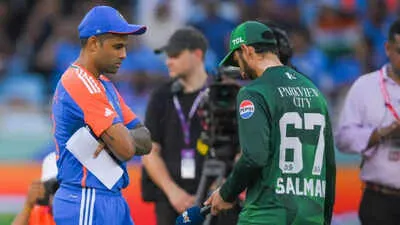
The Pakistan Cricket Board (PCB) is facing potential disciplinary action from the International Cricket Council (ICC) following multiple alleged breaches of tournament protocols during the 2025 Asia Cup. The issues include recording a meeting with match referee Andy Pycroft in a restricted area, misrepresenting the events in public statements, and possible violations of the Players and Match Officials Area (PMOA) rules.
The controversy began when Pakistan filmed a meeting between their team management and match referee Pycroft ahead of their match against the UAE. The ICC has raised concerns that this recording, done without prior approval, breached PMOA regulations that strictly control electronic devices and recordings in restricted zones. The board claimed the recording was for internal purposes and did not include audio, but the ICC considers the act itself a violation that undermines protocol integrity.
Further tensions arose over the PCB’s claim that Pycroft had apologized to Pakistan’s captain and manager following the “no-handshake” incident in the India-Pakistan match. The ICC clarified that Pycroft had merely expressed regret for a miscommunication and had not issued a formal apology, labeling the PCB’s public statements as misleading. These incidents have added to ongoing friction between the ICC and PCB, which also saw Pakistan unsuccessfully request the removal of Pycroft from officiating the Asia Cup.
In response, the PCB defended its actions, stating that media personnel were operating within what they believed were acceptable bounds of ICC rules. The board argued that the recording was conducted transparently and in good faith, intended solely to document proceedings internally rather than for public dissemination.
The ICC has described the PCB’s actions as “misconduct” and “multiple violations” of tournament regulations. While no formal penalties have yet been announced, the governing body has indicated that disciplinary measures could range from fines to more severe sanctions, depending on the results of its review. The ICC’s handling of the situation is being closely watched, as it may set important precedents for enforcing rules and managing disputes between national boards and the council.
The controversy underscores the need for strict adherence to established protocols during high-profile tournaments. For Pakistan, the situation is a reminder of the responsibilities that come with participating in ICC-sanctioned events, while for the ICC, it presents an opportunity to reaffirm its authority in maintaining fair play and operational standards.
As the Asia Cup continues, the PCB faces uncertainty regarding the outcome of the ICC investigation. The board’s next steps and the ICC’s potential sanctions will likely influence not only Pakistan’s approach to protocol compliance but also how other boards handle sensitive interactions with match officials in future tournaments.
12BET Shortlisted for Sportsbook Operator of the Year at SBC Awards 2025

